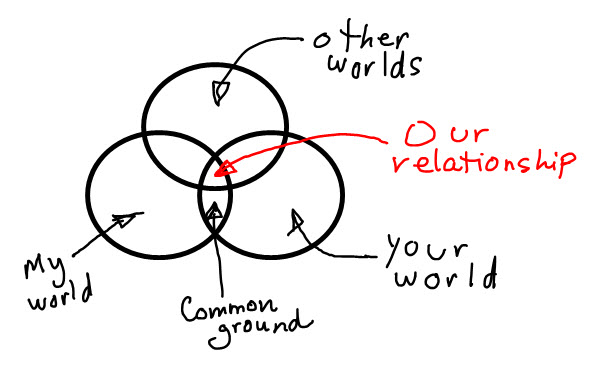Sometimes we forget that we are part of something bigger. This can happen anytime.
When we are in conflict, we tend to focus on the person we are in conflict with. There is something more, though, that speaks to our relationship.
Our relationship
Our relationship is not only about you and me. It’s also about those who are affected by our decisions. It’s about external influences. It’s about our experiences when apart from each other. It’s about unintended consequences, chance.
To resolve conflict, we look to find common ground. I like to think of relationship as part of our common ground, the part that intersects with our Other’ worlds. I visualize it like this:
Another way I try wrap my brain around something that really has no boundaries (i.e., relationship), is that you and I are first connections. Each of us also has other connections. Your experiences with your other connections are different from my experience with mine; my knowledge of the situation different from yours. Where all our connections and experiences intersect is the core of our relationship, and it’s the common ground which is most prized.
When we address the Other, in our relationship, we:
- commit to working together, in the long run, even after the agreement is signed and things happen; it’s only through relationships that we can move forward in sustainable ways.
- increase our understanding of the situation… the Other offers the potential for diversity, additional options for convergence and resolution
- acknowledge the choices we make are part of a bigger picture, the context of our situation to add context is to introduce multiple perspectives; critical for complex problem-solving
- give voice to all those affected; colleagues, family, friends, neighbours, our communites giving voice to others in our resolutions is paying it forward, its good karma
- move from single issues to our common ground, a place where multiple problems can be solved
- reality test our resolutions; by bringing in the Other we add complexity and nuance to our analysis
Ask for the Other
As a third party neutral, we can ask questions to help bring in the Other:
- What is something that you have not said in the conversation that you would like to mention now?
- How has this dispute impacted you, your family, your colleagues?
- How do your family, colleagues, view this dispute?
- Who will be affected if there is no resolution found?
My question for you
How do you conceptualize and/or visualize relationship? Leave a comment.


Speak Your Mind